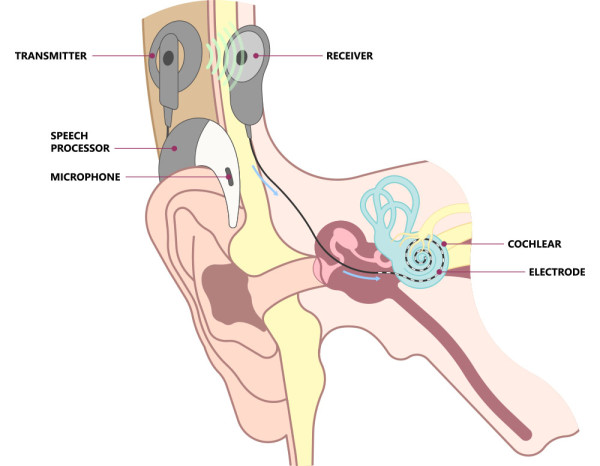Cochlear implant
A cochlear implant is a small device that helps people hear. It is used when hearing aids do not work for people who have severe hearing loss.
What a cochlear implant is
A cochlear implant is a device in 2 parts.
- A microphone behind your ear that picks up sounds and turns them into electrical signals.
- A wire (electrode) inside your skull that goes to your inner ear (cochlea). The electrical signal simulates your hearing (auditory) nerve to send nerve impulses to the auditory centres in your brain.

Benefits of a cochlear implant
Benefits of having a cochlear implant include:
- improved, sometimes normal hearing
- understanding speech
- hearing movies, television and music.
For children, having a cochlear implant and improved hearing can help with general and social development.
Cochlear implants do not suit or help everyone. You or your tamaiti will need a full assessment with:
- a hearing specialist (audiologist)
- a speech-language therapist
- an ear, nose and throat specialist (otolaryngologist).
They will decide if an implant is an option.
You will be referred for assessment by your healthcare provider.
Surgery for a cochlear implant
Surgery for a cochlear implant takes about 2 hours and is done under a general anaesthetic. This means you will be asleep during surgery.
The device is turned on a few weeks after the surgery. It can take weeks to months to get used to hearing, and you will need help from an audiologist and speech-language therapist.
Complications with a cochlear implant
Cochlear implants are generally safe. There are potential complications, as with all medical devices and procedures. These include:
- risks of general anaesthetic
- nerve injury from the surgery
- infection of the skin wound
- meningitis (inflammation of the area surrounding the brain)
- dizziness
- change in taste
- hearing differently or losing any of your natural hearing.
Cochlear implants require batteries. These will need to be replaced often for the device to continue functioning correctly.
Cost of a cochlear implant
You may be able to get free treatment in the public health system if you meet the criteria.
Who can get a cochlear implant? — Disability Support Services
You can also choose to pay for a cochlear implant for yourself or your tamaiti in the private health system.
ACC may fund the implant if your hearing loss was caused by an accident.
The Accident Compensation Corporation (ACC) is a government agency that helps pay for treatment if you are injured in an accident.
The ACC provides comprehensive, no-fault personal injury cover for all residents and visitors to Aotearoa New Zealand. This means if you are hurt in an accident, ACC can help no matter who caused the accident.
If you have an accident and need emergency care in a hospital, it will be covered by ACC.
ACC usually pays some of the other medical costs if you have an accident, like surgery, physiotherapy and medicines. ACC may also be able to cover some loss of earnings resulting from an accident.
I'm injured — The Accident Compensation Corporation